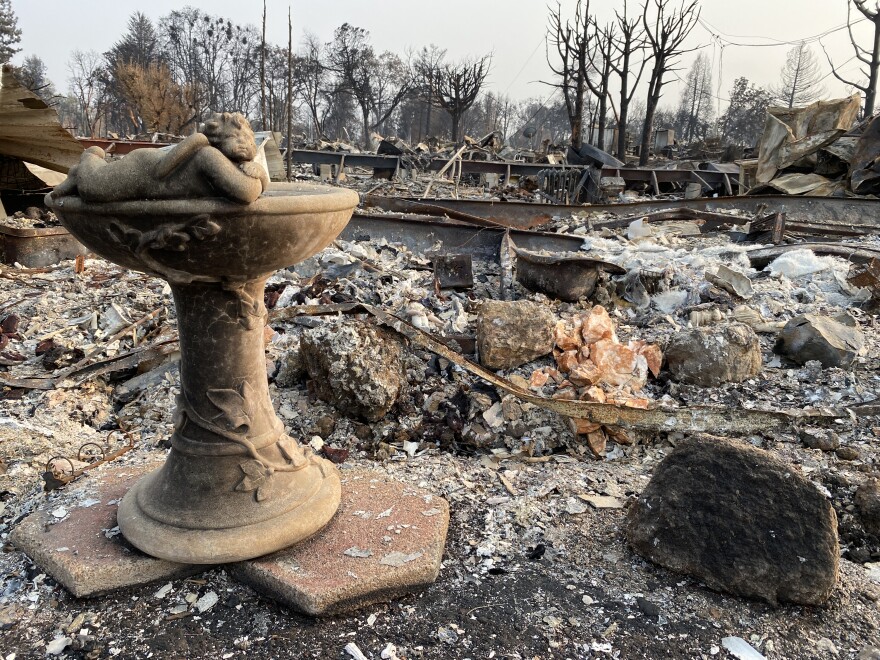
Most of the homes at the Royal Oaks Mobile Manor in Medford were destroyed by the Almeda Fire in September.
/ JPR News
ARI SHAPIRO, HOST: When a climate disaster hits, displaced people scatter, and many never return home. Reporter Katia Riddle has a story of a town in Southern Oregon that’s tried to prevent this kind of exodus.
KATIA RIDDLE, BYLINE: Ask people in Talent, Ore., about the fire, and there’s one thing you hear again and again. Until it happens to you, you can’t understand.
DARBY AYERS-FLOOD: I’d liken it to standing at the Grand Canyon for the first time. You just can’t reconcile what you’re looking at.
RIDDLE: It’s been 16 months since the Alameda Fire leveled this town. There were close to 7,000 people there at the time. Darby Ayers-Flood cries when she recalls seeing her burnt-down home for the first time.
AYERS-FLOOD: There was a piece of the picket fence left and the cement staircase that went to the front door. And, you know, that’s the front yard where I had birthday parties and a life there with my children.
RIDDLE: She and her wife scrambled to pick up the pieces of their lives. Ayers-Flood also had much bigger problems to think about. That’s because she’s the mayor of Talent. For guidance on rebuilding, she turned to some people with experience.
AYERS-FLOOD: We listened to lessons learned from Paradise.
RIDDLE: The town of Paradise, Calif., is about four hours to the south. It was gutted in a fire several years previous. Paradise saw much of their community slip away forever. Ayers-Flood realized that FEMA’s help would not be enough.
UNIDENTIFIED CHILD: I want a yogurt.
NATALIE GILBERT: You want a yogurt.
RIDDLE: Natalie Gilbert is the sort of person the mayor feared would suffer the most. Gilbert’s feeding her 4-year-old son breakfast on this day.
UNIDENTIFIED CHILD: I’ll open mine.
RIDDLE: When the fire hit, Gilbert’s house was destroyed, but she didn’t have proof of a rental agreement and didn’t receive any federal assistance. The fire radically increased rents overnight.
GILBERT: The rent is two or three times what your income is.
RIDDLE: For more than a year, she and her four kids slept wherever they could find shelter. Until a few weeks ago, there were cramped in a tiny travel trailer on the outskirts of town.
GILBERT: Where we were at wasn’t a doable situation.
RIDDLE: Then Gilbert heard about the city’s new housing project for displaced fire victims. It holds 52 RVs. They’re twice the size of that trailer and brand-new, walking distance to the kids’ school. Gilbert’s new home accommodates her whole family.
GILBERT: This couch also comes down and turns into a bed.
RIDDLE: City leaders used over $2 million from private donations to build this transitional housing. At 12, Sarah is the oldest of the children in this family.
SARAH: I like this area.
RIDDLE: She’s sitting in her new living room. Having multiple rooms is a luxury.
SARAH: There’s a couch, and there’s the TV here.
RIDDLE: Sarah seems happy on this day, but she’s been withdrawn over the last year, quiet.
TRACY KOA: For some kids, it’s - you know, they shut down. They aren’t interested in building relationships with friends or teachers or staff.
RIDDLE: Tracy Koa says many students here have endured a pandemic, a natural disaster and ongoing displacement. She coordinates social services at the school. There are at least 400 homeless students there.
KOA: I mean, there’s families living in their cars.
RIDDLE: Koa is working this month to move more of these families into the new RV development. Still, Mayor Ayers-Flood estimates the town has lost at least 25% of its population. And she has a message for other communities facing disaster.
AYERS-FLOOD: You have to act fast to get people back home.
AILSA CHANG, HOST: That was reporter Katie Riddle in Talent, Ore.
Transcript provided by NPR, Copyright NPR.

